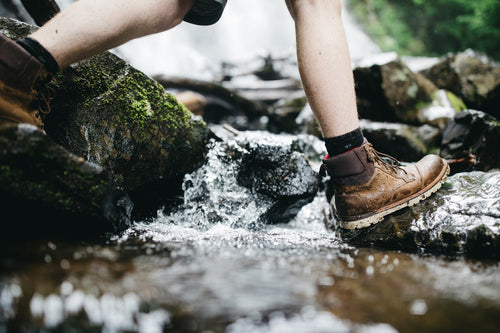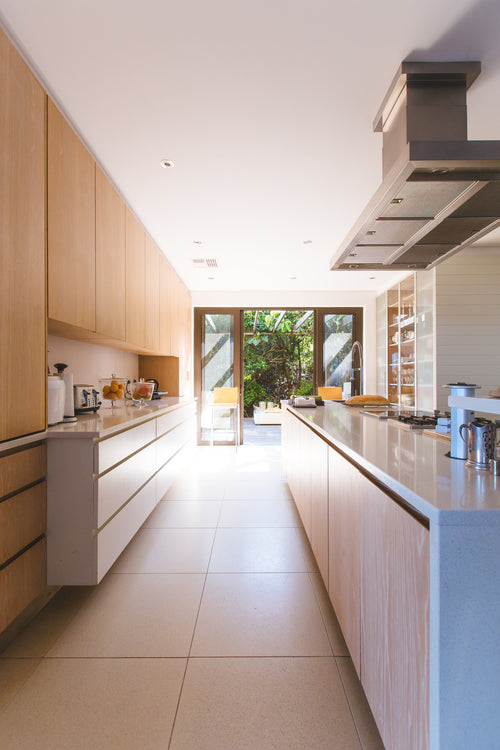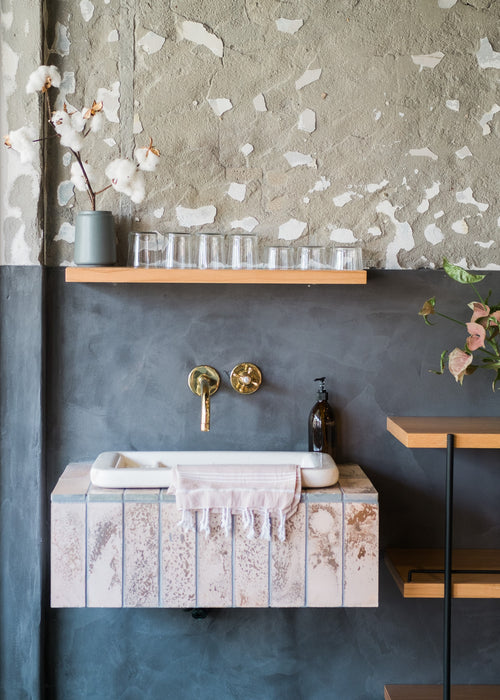HOW TO ENHANCE YOUR NATURAL STONE'S WET LOOK

Most people would agree that natural stone countertops elevate the look and feel of your home’s interior. Whether you go with granite, marble, limestone, quartz, or soapstone—natural stone adds beauty, flair, and durability to your kitchen or bath.
Of course, you want to properly care for and protect your investment, so we’ll share some general maintenance tips that apply to natural stone. And since many people desire the glossy, rich appearance their stone countertops have when wet, we’ll also let you know how to achieve those enriched tones and shiny finish even when the surface is dry.
PRACTICAL TIPS: PROTECTING NATURAL STONE COUNTERS.
-
Spills happen. Even if your countertop is sealed with a nontoxic, penetrating sealer, wipe spills up right away, especially if the culprit is wine, vinegar, citrus juice, or harsh chemicals like bleach or ammonia (which could cause acid etching).
-
Trivets are your friend. While hot pots and pans won’t scorch or burn stone, they can create a thermal shock, which could crack stone counters.
-
Cutting boards are a must. Never chop or slice directly on your stone counters; while most stone is incredibly scratch resistant, it’s not scratch proof.
-
Use step stools. While stone counters are prized for their durability, they aren’t built to handle adults standing on them to reach upper-level cabinets.
BEAUTY TIPS: ENHANCING THE SHINE OF NATURAL STONE
Because natural stone materials are porous, dirt and grime can collect in the surface “pores,” which then serve as a breeding ground for bacteria. Over time, this can cause your countertops to lose their natural luster and become dull. Luckily, sealers can protect and enhance stone counters whether you have granite, marble, limestone, quartz, soapstone (which tends to be less porous) or other surface material.
Clean with mild dish soap. Because of its gentle nature, dish soap is considered a safe everyday cleaner for natural stone countertops. Simply fill a spray bottle with warm water and add a few drops of dish soap. Spray your countertops, wipe with a damp cloth and dry the surface.
Seal for gleam and protection. Not all stone sealers are equal, however. Some “penetrating sealers” feature a water or solvent that carries the coating into the pores—but then evaporates. The coating remains on the internal surface, but with gaps that can collect and conceal bacteria. Then there are the “non-penetrating" sealers that sit on top of the pores, sealing just the surface; the surface is no longer stone, but the sealer itself, susceptible to scratches and heat, and much less durable than stone. The optimum surface sealer satiates the pores with liquid that never evaporates, leaving a coating that seals pores and the whole surface, inside out.
Now that you know what kind of sealers not to use, what should you look for to enhance your countertop’s shimmer? Here are a few guidelines.
-
Harmless. Find a sealer that’s 100% nontoxic, food-safe immediately after you use it, BPA-free and contains no harsh chemicals.
-
Odorless. Added fragrances are unnecessary. And after all, wouldn’t you rather smell those cookies baking in the oven or that pot roast simmering on the stove?
-
100% active. Don’t pay for solvents or water, which are used as carriers in many products.
-
Easy to use. You should be able to apply the sealer as part of your routine cleaning or to quickly add that extra “oomph” to your stone surfaces to impress guests. You shouldn’t have to wait for it to dry or cure, either.
-
Multi-surface. For convenience, seek a sealer that can also be used on other kitchen and home surfaces, like stainless steel.
Stone countertops add elegance and beauty to your home, but measures need to be taken to keep them looking clean, shiny and smooth. With these tips for caring for and sealing your stone surfaces, you’ll have them looking as great as the day they were installed for years to come.



